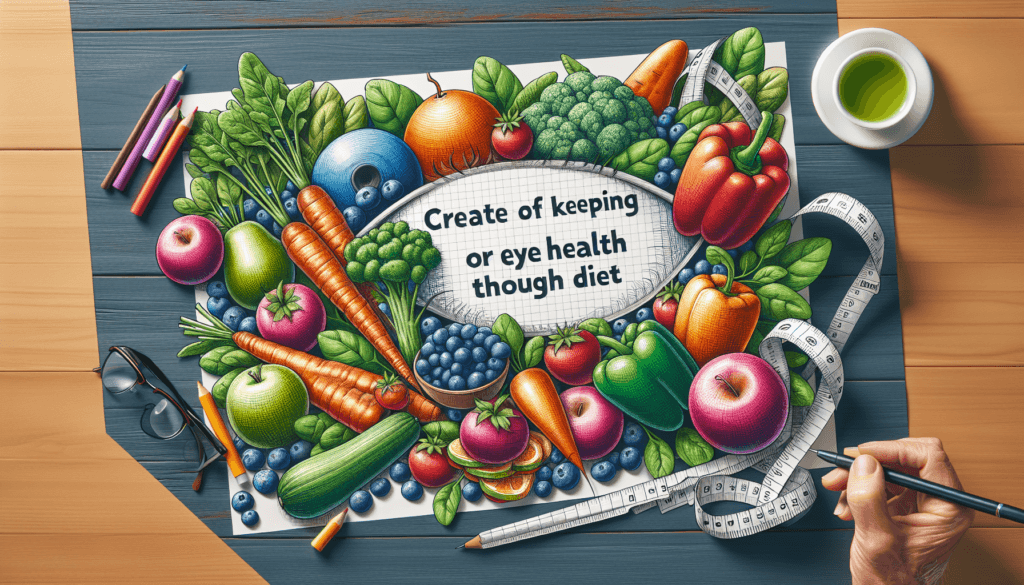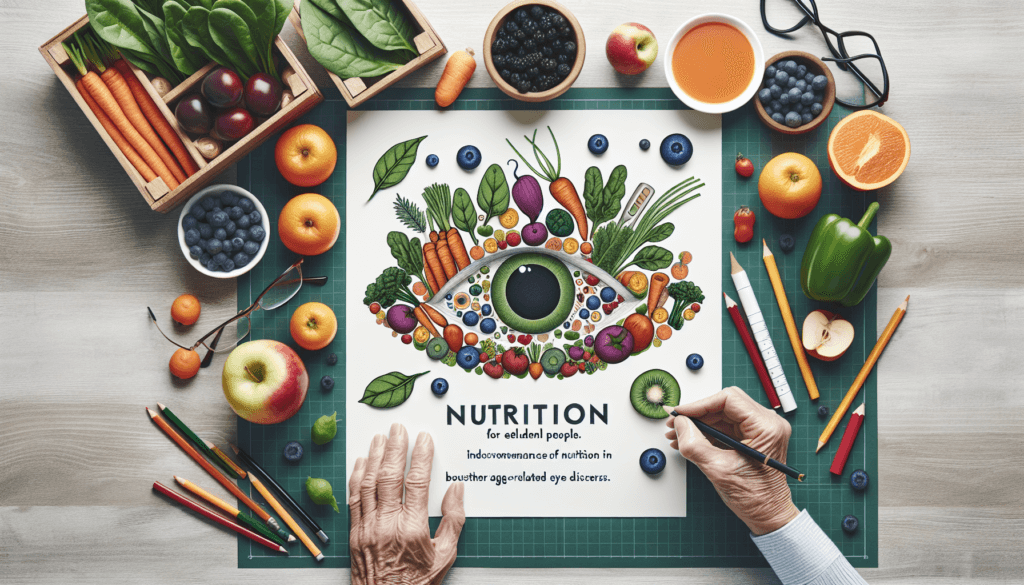Are you a baby boomer concerned about maintaining your eye health? Good news! There are simple ways you can support your eye health through nutrition. In this article, we will explore the various nutrients that are beneficial for your eyes and the foods that contain them. By incorporating these foods into your diet, you can take proactive steps towards ensuring optimal eye health as you age. So let’s dive into the world of nutrition and discover how you can nourish your eyes for a clear and vibrant future.

Importance of Eye Health
Your eyes are a precious gift, allowing you to see the beauty of the world around you. Taking care of your eye health is essential, especially as you age. The aging process can affect your eyes in various ways, leading to common eye health issues in boomers. However, by incorporating key nutrients into your diet and maintaining a healthy lifestyle, you can support your eye health and preserve your vision for years to come.
Understanding the Aging Process of the Eyes
As you age, your eyes undergo natural changes that can impact your vision. The lenses in your eyes become less flexible, making it harder to focus on close objects. The muscles responsible for controlling eye movement and pupil size may weaken, leading to difficulties in tracking moving objects or adjusting to different light conditions. Additionally, the number of cells in the retina, which is responsible for detecting light, may decrease over time, affecting your ability to perceive fine details and colors. Understanding these changes can help you make informed decisions about your eye health and take proactive measures to support it.
Common Eye Health Issues in Boomers
As boomers age, they become more susceptible to certain eye health issues. Some common ones include age-related macular degeneration (AMD), cataracts, glaucoma, and dry eyes. AMD is a condition that affects the macula, the central part of the retina responsible for sharp, central vision. It is one of the leading causes of vision loss in people over 50. Cataracts occur when the natural lens in the eye becomes cloudy, leading to blurred vision. Glaucoma is a group of eye diseases characterized by damage to the optic nerve, usually caused by increased pressure in the eye. Finally, dry eyes result from a lack of sufficient tears to lubricate the surface of the eye. By being aware of these issues, you can take proactive steps to prevent or manage them.
Key Nutrients for Eye Health
To support your eye health, it is crucial to include key nutrients in your diet. These nutrients play a vital role in maintaining the health and function of your eyes.
Vitamin A and Beta Carotene
Vitamin A is essential for the production of a pigment called rhodopsin, which helps your eyes adjust to changes in light. It also promotes good night vision and overall eye health. Beta carotene, a precursor to vitamin A, is found in colorful fruits and vegetables such as carrots, sweet potatoes, and spinach. By incorporating these foods into your diet, you can provide your eyes with the vitamin A they need.
Vitamin C and Antioxidants
Vitamin C is a powerful antioxidant that helps protect the eyes against damage caused by free radicals. It is found in citrus fruits such as oranges, grapefruits, and strawberries. Antioxidants, in general, help reduce the risk of developing AMD and slow down its progression. By including vitamin C-rich foods in your diet, you can support your eye health and reduce the risk of age-related eye diseases.
Vitamin E and Omega-3 Fatty Acids
Vitamin E is another antioxidant that helps protect the cells in your eyes from oxidative damage. It can be found in foods such as almonds, sunflower seeds, and spinach. Omega-3 fatty acids, on the other hand, are beneficial for the overall health of your eyes and can reduce the risk of developing dry eyes and AMD. Good sources of omega-3 fatty acids include fatty fish like salmon, trout, and mackerel.
Zinc and Copper
Zinc is a mineral that plays a crucial role in maintaining good eye health. It is involved in the metabolism of vitamin A and helps transport it from the liver to the retina. Zinc is found in foods like lean meats, poultry, and oysters. Copper, another mineral, is essential for the formation of connective tissue in the eyes and plays a role in reducing the risk of developing cataracts. Copper can be found in nuts, seeds, and whole grains.
Lutein and Zeaxanthin
Lutein and zeaxanthin are two antioxidants that are important for maintaining the health of the macula in the retina. They filter out harmful high-energy light and reduce the risk of developing AMD and cataracts. Leafy greens such as spinach and kale, as well as other colorful vegetables like broccoli and peas, are excellent sources of these nutrients.
By incorporating these key nutrients into your diet, you can provide your eyes with the necessary support to maintain good eye health and reduce the risk of developing age-related eye diseases.

Incorporating Nutrient-Rich Foods
Now that you know the importance of key nutrients for eye health, let’s explore some nutrient-rich foods you can incorporate into your diet.
Leafy Greens and Colorful Vegetables
Leafy greens such as spinach, kale, and collard greens are packed with lutein and zeaxanthin, which are essential for maintaining macular health. These vegetables can be incorporated into your diet through salads, stir-fries, or even smoothies. Additionally, colorful vegetables like carrots, sweet potatoes, and bell peppers provide beta carotene and vitamin A, which are important for good night vision and overall eye health.
Citrus Fruits and Berries
Citrus fruits like oranges, grapefruits, and lemons are rich in vitamin C, an important antioxidant for eye health. Berries like strawberries, blueberries, and raspberries also contain vitamin C and other antioxidants that help protect your eyes. Enjoy these fruits as a snack, in smoothies, or added to your breakfast cereal for a delicious and nutritious boost to your eye health.
Fish and Nuts
Fatty fish like salmon, trout, and mackerel are excellent sources of omega-3 fatty acids, which support the overall health of your eyes. These fatty acids can reduce the risk of dry eyes and age-related macular degeneration. If you’re not a fan of fish, you can still get omega-3 fatty acids from walnuts, flaxseeds, and chia seeds. These nuts and seeds can be added to salads, oatmeal, or incorporated into your baking.
Eggs and Dairy Products
Eggs are a good source of vitamins A, E, and zinc, all of which are beneficial for maintaining good eye health. They can be enjoyed in various ways, from omelettes to hard-boiled eggs. Dairy products like milk and cheese also provide vitamins A and zinc, making them a convenient and nutritious addition to your diet.
Legumes and Whole Grains
Legumes such as lentils, chickpeas, and black beans are rich in zinc, which is important for transporting vitamin A to the retina. Whole grains like quinoa, brown rice, and oats also contain zinc and other eye-healthy nutrients. These foods can be incorporated into meals as side dishes or used as the base for salads and grain bowls.
By incorporating these nutrient-rich foods into your diet, you can ensure that your eyes receive the necessary nutrients for optimal health and function.
Recipes for Eye Health
To help you incorporate nutrient-rich foods into your diet, here are some eye-healthy recipes:
Roasted Carrot and Sweet Potato Soup
Ingredients:
- 4 carrots, peeled and chopped
- 1 large sweet potato, peeled and chopped
- 1 onion, chopped
- 2 cloves of garlic, minced
- 4 cups vegetable broth
- 1 teaspoon cumin
- Salt and pepper to taste
- Olive oil for roasting
Instructions:
- Preheat the oven to 400°F (200°C).
- Place the carrots, sweet potato, onion, and garlic on a baking sheet. Drizzle with olive oil and season with salt, pepper, and cumin.
- Roast the vegetables in the oven for 25-30 minutes, or until they are tender and slightly caramelized.
- Transfer the roasted vegetables to a pot and add the vegetable broth. Bring to a boil, then reduce heat and simmer for 15-20 minutes.
- Using an immersion blender or a regular blender, blend the soup until smooth.
- Season with additional salt and pepper if needed.
- Serve hot and enjoy the eye-healthy goodness of this delicious soup!
Citrus Berry Smoothie Bowl
Ingredients:
- 1 frozen banana
- 1 cup mixed berries (strawberries, blueberries, raspberries)
- 1/2 cup freshly squeezed orange juice
- 1 tablespoon chia seeds
- Toppings: sliced citrus fruits, granola, coconut flakes, chopped almonds
Instructions:
- In a blender, combine the frozen banana, mixed berries, orange juice, and chia seeds.
- Blend until smooth and creamy.
- Pour the smoothie into a bowl.
- Top with sliced citrus fruits, granola, coconut flakes, and chopped almonds.
- Enjoy this refreshing and nutrient-packed smoothie bowl for a healthy breakfast or snack.
Herb-Roasted Salmon with Spinach Salad
Ingredients:
- 2 salmon fillets
- 1 tablespoon olive oil
- 1 tablespoon chopped fresh herbs (such as dill, parsley, or thyme)
- Salt and pepper to taste
- 4 cups fresh baby spinach
- 1/2 cup cherry tomatoes, halved
- 1/4 cup sliced red onion
- 1/4 cup crumbled feta cheese
- 2 tablespoons balsamic vinaigrette
Instructions:
- Preheat the oven to 400°F (200°C).
- Place the salmon fillets on a baking sheet lined with parchment paper.
- Drizzle the salmon with olive oil and sprinkle with chopped herbs, salt, and pepper.
- Roast the salmon in the oven for 12-15 minutes, or until it is cooked to your desired level of doneness.
- In a large bowl, combine the baby spinach, cherry tomatoes, red onion, feta cheese, and balsamic vinaigrette. Toss to coat the salad evenly.
- Divide the spinach salad onto plates and place a roasted salmon fillet on top of each.
- Serve and enjoy this nutritious and flavorful meal that supports your eye health.
Spinach and Mushroom Omelette
Ingredients:
- 3 eggs
- 1 cup fresh spinach, chopped
- 1/2 cup sliced mushrooms
- 1/4 cup diced onion
- 1/4 cup shredded cheese (such as cheddar or feta)
- Salt and pepper to taste
- Olive oil for cooking
Instructions:
- In a bowl, beat the eggs and season with salt and pepper.
- Heat olive oil in a non-stick skillet over medium heat.
- Add the onion and mushrooms to the skillet and sauté until the mushrooms have released their moisture and the onion is translucent.
- Add the chopped spinach to the skillet and cook until wilted.
- Pour the beaten eggs into the skillet, ensuring they cover the vegetables evenly.
- Sprinkle the shredded cheese on top of the eggs.
- Cook the omelette until the eggs are set and the cheese is melted.
- Fold the omelette in half and transfer to a plate.
- Enjoy this hearty and nutritious spinach and mushroom omelette for a delicious and eye-healthy breakfast or brunch.
Quinoa Salad with Black Beans and Avocado
Ingredients:
- 1 cup cooked quinoa
- 1 cup canned black beans, rinsed and drained
- 1 ripe avocado, diced
- 1/2 cup diced bell pepper
- 1/4 cup chopped fresh cilantro
- 2 tablespoons lime juice
- 1 tablespoon olive oil
- Salt and pepper to taste
Instructions:
- In a large bowl, combine the cooked quinoa, black beans, diced avocado, diced bell pepper, and chopped cilantro.
- In a small bowl, whisk together the lime juice, olive oil, salt, and pepper to make the dressing.
- Pour the dressing over the quinoa salad and toss to coat the ingredients evenly.
- Serve this delicious and nutrient-rich quinoa salad as a side dish or a main course for a satisfying meal that supports your eye health.

Supplements for Eye Health
While a diet rich in nutrient-dense foods is the best way to support your eye health, supplements can also be beneficial, especially if you have difficulty obtaining certain nutrients from your diet. Before taking any supplements, it is important to consult with a doctor or optometrist to determine if they are suitable for you.
Consulting a Doctor or Optometrist
A doctor or optometrist can evaluate your overall health and assess your specific eye health needs. They can help determine if supplements are necessary and guide you in choosing the right ones. It is important to disclose any medications you are taking or any existing eye conditions to ensure the supplements do not interfere with your current treatment or worsen your condition.
Choosing High-Quality Supplements
When choosing supplements, it is important to select high-quality products from reputable brands. Look for supplements that are third-party tested for purity and quality, as well as those that contain the specific nutrients recommended for eye health. Be cautious of supplements that make exaggerated claims or promise miraculous results. Remember that supplements should complement a healthy diet, not replace it.
By consulting a healthcare professional and selecting high-quality supplements, you can enhance your eye health and ensure that your body receives the necessary nutrients for optimal vision and overall well-being.
Lifestyle Habits for Eye Health
In addition to proper nutrition, certain lifestyle habits can significantly contribute to the maintenance of good eye health.
Protecting Eyes from UV Rays
Exposure to UV rays from the sun can have damaging effects on your eyes. Prolonged and frequent exposure to UV rays can increase the risk of developing cataracts and other eye conditions. To protect your eyes, it is important to wear sunglasses that offer 100% UV protection when you are outdoors. Additionally, wearing a wide-brimmed hat can provide additional protection from the sun’s rays.
Taking Regular Breaks during Screen Time
In today’s digital age, many of us spend extended periods in front of screens, whether it’s for work or leisure. Prolonged screen time can cause eye strain and dryness, leading to discomfort and potential eye problems. To minimize the impact of screen time on your eyes, it is important to take regular breaks. Follow the 20-20-20 rule: every 20 minutes, look away from the screen and focus on an object at least 20 feet away for 20 seconds. This helps relax your eye muscles and reduce eye strain.
Avoiding Smoking and Excessive Alcohol Consumption
Smoking and excessive alcohol consumption can have detrimental effects on your overall health, including your eye health. Smoking increases the risk of developing cataracts, macular degeneration, and other eye conditions. Excessive alcohol consumption can lead to nutritional deficiencies that can affect the health of your eyes. By avoiding smoking and moderating your alcohol intake, you can protect your eyes and maintain good overall health.
By adopting these lifestyle habits, you can make a positive impact on your eye health and reduce the risk of developing age-related eye conditions.

Eye-Healthy Hydration
Proper hydration is important for overall health, including the health of your eyes.
Importance of Staying Hydrated
Staying properly hydrated is crucial for maintaining the proper balance of fluids in your body. The eyes, like all other organs, require adequate hydration to function optimally. Dehydration can lead to dry eyes, which can cause discomfort, blurred vision, and increased risk of eye infections. By staying properly hydrated, you can ensure that your eyes receive the moisture they need to stay healthy and lubricated.
Hydrating Beverages for Eye Health
Water is the best beverage choice for overall hydration, including eye health. Aim to drink at least 8 glasses of water per day, or more if you engage in physically demanding activities or live in a hot climate. Additionally, certain beverages can provide additional hydration benefits. Herbal teas, such as chamomile or green tea, can help soothe dry eyes and provide antioxidants that support eye health. Avoid excessive consumption of sugary or caffeinated beverages, as they can have a diuretic effect and contribute to dehydration.
By staying properly hydrated and incorporating hydrating beverages into your routine, you can support the health and function of your eyes.
Conclusion
Your eyes are precious, and taking care of them is crucial for maintaining good vision and overall well-being. By understanding the aging process of the eyes, being aware of common eye health issues in boomers, and incorporating key nutrients into your diet, you can support your eye health and reduce the risk of developing age-related eye conditions. Additionally, adopting lifestyle habits such as protecting your eyes from UV rays, taking regular breaks during screen time, avoiding smoking and excessive alcohol consumption, and staying properly hydrated can further contribute to the maintenance of optimal eye health. Remember to consult with a healthcare professional before introducing any supplements and to choose high-quality products. By prioritizing your eye health, you can continue to enjoy the beauty of the world around you for years to come.



